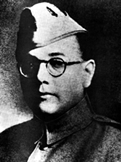Bose, Subhas Chandra

Bose, Subhas Chandra (1897-1945) Nationalist leader of the left-wing Congress, founding leader of the forward bloc, Commander-in-Chief of the indian national army (INA). Subhas Chandra Bose was the ninth among fourteen children of his parents Janakinath Bose and Prabhavati Devi. Janakinath Bose migrated from Kodalia village in the district of 24-Parganas, West Bengal, to Cuttack where Subhas was born (23 January 1897) and brought up and had his early education.
His college education started at the Presidency College wherefrom he was expelled due to alleged misconduct with a European teacher. He then joined the Scottish Church College, Calcutta, from where he graduated with Honours in Philosophy with distinction. To appear in the ICS examination he went to England in 1919 and was successful in entering the coveted Indian Civil Service, but immediately afterwards he changed his mind. He resigned from the Service and joined Indian nationalist politics under the able leadership of chitta ranjan das. Subhas Bose was appointed Chief Executive Officer of the calcutta corporation in 1924. He was imprisoned in 1924 for keeping close association with militant nationalists. He was released on medical grounds in 1927. Thereafter he became President of the Bengal Provincial Congress Committee. At the historic session of the Calcutta Congress (1928) Subhas worked as the Commanding Officer of the Congress Volunteer Corps. It was at the same session that Subhas and Jawaharlal Nehru spearheaded the move for complete independence of India while Gandhi and Motilal Nehru favoured Dominion status. Subhas was President of the Bengal Provincial Congress Conference, 1929.
Bose became President of the All India Trade Union Congress in 1929 and Mayor of the Calcutta Corporation the following year. He very actively participated in Gandhi's Salt Satyagraha movement in 1930 for which he was put behind bars. After being released from jail he took a dissident stand against the Gandhi-Irwin Pact (1931). Subhas was arrested for the third time under the notorious Regulation 111 of 1818. In jail his health deteriorated so seriously that he was released on health grounds and immediately he went to Europe for treatment. While in Europe, he made contacts with different European personalities who sympathised with the demand for Indian independence.
Subhas was unanimously elected President of the Congress in 1938, and was re-elected the following year. But soon he became alienated from the core Congress leadership due to his militant stand. MK Gandhi himself went against him. Under the circumstances, he opted to resign his Presidency in April 1939. To promote his political views, he founded the Forward Bloc within the Congress in the same year, and tried to consolidate the revolutionary forces of India in general and of Bengal in particular.
Subhas supported the Axis powers in the Second World War (1939-1945). The Congress Working Committee took disciplinary action against Subhas for criticising the Congress Ministries formed in seven provinces after the election of 1937. He arranged an Anti-Compromise Conference at Ramgarh, Bihar in March 1940 under the joint auspices of the Forward Bloc and the Kisan Sabha. It was under his leadership that the Nagpur session of the All India Forward Bloc, held in June 1940, placed the demand for the establishment of a Provisional National Government in India. In July 1940 Subhas Chandra Bose was arrested in connection with his involvement in the movement for the removal of the Holwell Monument in Calcutta. While in jail, he went on hunger strike and was released in December 1940.
On 26 January 1941 Subhas secretly left Calcutta, crossed the border of India through the Northwestern Frontier and entered Russia through Kabul. After his arrival in Berlin, he enlisted German support to organise anti-British movements. He formed the Provisional Independent Government for India, and began to propagate his ideas through regular broadcasts from Berlin. From Germany he also made contacts with Japan. Backed by the Governments of both Germany and Japan, Subhas started his voyage to Singapore in a submarine and reached there on July 2, 1943. Indian prisoners-of-war, held by the Japanese, showed tremendous enthusiasm on his arrival in Singapore. Meanwhile, rashbehari bose, an Indian revolutionary in Japan, organised the Indian Independence Movement in East Asia. He formed the 'Azad Hind Fauj' (Indian National Army).
Rash Behari Bose formally handed over charge of the INA to Subhas Bose, who became its Commander-in-Chief on 25 August 1943 and declared the formation of the Provisional Government of Azad Hind on October 21 of the same year. He transferred the headquarters of the INA to Rangoon in January 1944. From Rangoon he conducted military operations against the British forces on the Burma borders and began his onward march towards India. He captured two of the British outposts on the way towards Imphal and Kohima in March 1944 and there hoisted the flag of free India. Subhas was reportedly killed in an air crash in Formosa in August 1945. [Chitta Ranjan Misra]
